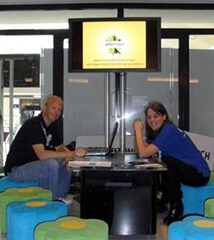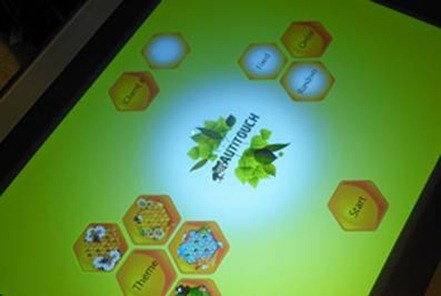Touching Children’s Lives with Microsoft Surface Technology
By William Jansen, CSS Community Program Manager, EMEA, Microsoft
In 2008, Freena Eijffinger’s brother was diagnosed with Asperger’s Disorder, a form of autism. It had taken more than seven years for the doctors to diagnose him, and that left Freena curious as to why it had taken so long. She did a bit of research and discovered that all diagnostics were still being carried out manually and without any computerization. This was mainly because regular vertical monitors interfere with direct communication, and the limited motor skills of Asperger sufferers make the computer mouse a poor tool for any diagnostic activities. When she first became acquainted with the Surface technology, which requires neither a monitor nor a mouse, she knew exactly what she had to do—raise funds to develop software on the Surface platform to change the lives of children with autism worldwide.
Her Surface activities soon got the attention of Microsoft Netherlands, who named her a “Surface-evangelist.” Freena has since been a frequently invited speaker at conferences such as DevDays, TechEd EMEA, DotNed, HealthValley, TEDxWomen, and CodeCamp as well as at other industry-specific healthcare and educational conventions. Together with Dennis Vroegop she taught Surface development at a university college in the Netherlands.
In early 2010 Freena entered a program for entrepreneurs sponsored by the Dutch government and TNO – The leading independent research organization in the Netherlands, known as SBIR (Small Business Innovation & Research). She was awarded €25,000 to do an attainability analysis and to develop four demo-applications that could be used to prove the value of her project to the autism branch of healthcare. When the Microsoft Surface team heard about her project, they donated a Surface developer unit. Following a review of the results from Freena’s research, TNO invested an additional €300,000 in her and her company Autitouch to develop applications to support diagnostics and treatment of autism worldwide.
 In 2009, Dennis Vroegop, a Microsoft Surface Most Valuable Professional (MVP) and DotNed chairman, learned of Freena’s progress with Surface as well as her thoughts on its possible applications, and he asked to lend a hand.
In 2009, Dennis Vroegop, a Microsoft Surface Most Valuable Professional (MVP) and DotNed chairman, learned of Freena’s progress with Surface as well as her thoughts on its possible applications, and he asked to lend a hand.
“Developing for Surface is just like any other piece of software,” according to Dennis. “You have to have a design, skilled developers and designers, and of course a lot of passion.” Building on Freena’s design, Dennis drew up the functional specifications for the Surface applications. “When that was done, we set up a Team Foundation Server to hold all the project resources and then started working on the actual software,” Dennis added. (Pictured above left: Dennis Vroegop, Surface MVP from the Netherlands, and Freena Eiffinger, CEO of Autitouch)
The actual development has been completed in about 150 hoursand the applications will be released later this month, then a six-month scientific research project will begin in collaboration with the psychology department of the VU University Amsterdam for validation. A group of 60 kids – 30 diagnosed with autism and 30 without autism – will be tested using the applications. The goal is to show that with the help of the Autitouch applications, pre-diagnostics can be made possible, which will considerably shorten the diagnosis time for children with disorders such as autism. Other benefits will be improved and faster data mining and reporting, better quality observation and increased objectivity on the part of the diagnosing professional. All data will be unlocked through Microsoft’s Azure platform and Microsoft HealthVault, enabling autism experts around the world to gain better insight into autism as a disorder.
During the validation phase, experts will start to test the systems functionality and ease of use. So far the trial runs have gone extremely well-the patients have responded very well to the system.
We are extremely positive about the rest of the project. When the validation is done and we are ready to deliver to the actual intended users we won't sit back and relax: there is so much more to be done in this field and we're looking forward to the next phases!
For more information on Autitouch – visit www.autitouch.com
For more information on Microsoft’s Citizenship effort please visit: Microsoft.com/Citizenship
To stay up to date on the latest Citizenship Stories:
Twitter.com/msftcitizenship (@msftcitizenship)
Facebook.com/MicrosoftCitizenship
SHARE this story with those you think could benefit!
